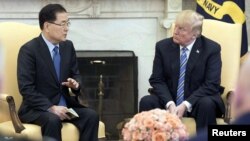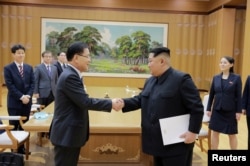North Korea's neighbors welcomed U.S. President Donald Trump's surprise decision to meet with North Korean leader Kim Jong Un to discuss ending the North's threatening nuclear program.
Since the talks were announced late Thursday in Washington, U.S. lawmakers, Chinese, Japanese and South Korean officials have embraced the development. But there is also caution over possible outcomes from the high-stakes talks.
China's Foreign Ministry spokesperson called direct dialogue between the two leaders a "positive signal."
Japanese Prime Minister Shinzo Abe, who has been suspicious of North Korea’s motives, spoke with Trump on Thursday and praised Trump's hardline leadership for forcing Pyongyang to change. Abe said he plans to visit Trump in Washington next month to discuss the summit with North Korea.
U.S. Senator Lindsey Graham suggested the talks show stepped up U.S. sanctions are having an impact.
"After numerous discussions with President Trump, I firmly believe his strong stand against North Korea and its nuclear aggression gives us the best hope in decades to resolve this threat peacefully," he said.
Graham also said the United States is not going into the talks with high expectations.
"I am not naive. I understand that if the past is an indication of the future, North Korea will be all talk and no action."
It is not clear what Kim will want in exchange for abandoning a nuclear weapons program that has been a core focus since he became supreme leader in late 2011.
The talks are a high-stakes gamble. Success could mean significantly de-escalating tensions over North Korea’s accelerated nuclear and ballistic missile tests over the past two years, which have grown sophisticated enough to threaten the U.S. If the talks fail, it could worsen the situation.
Robert Gallucci, chief U.S. negotiator during the 1994 North Korean nuclear crisis, said North Korea's invitation is a "surprising and welcome development. He added, "If representatives of both governments can meet, and a summit ultimately is held, it would represent substantial progress in reducing tension and the risk of war."
"What is new isn't the proposal, it's the response," said Daniel Russell, former U.S. assistant secretary of state for East Asia and the Pacific." He said North Korea "has for many years proposed that the president of the United States personally engage with North Korea's leaders as an equal - one nuclear power to another."
President Trump has been critical of past efforts by the administrations of Bill Clinton, George W. Bush and Barack Obama to resolve the North Korean nuclear threat through negotiations. These past deals slowed the North’s nuclear progress, but Pyongyang covertly continued its development efforts and eventually reneged on pledges to dismantle its nuclear facilities.
VOA Correspondent Brian Padden and reporter Lee Yoon-jee in Seoul contributed to this report





